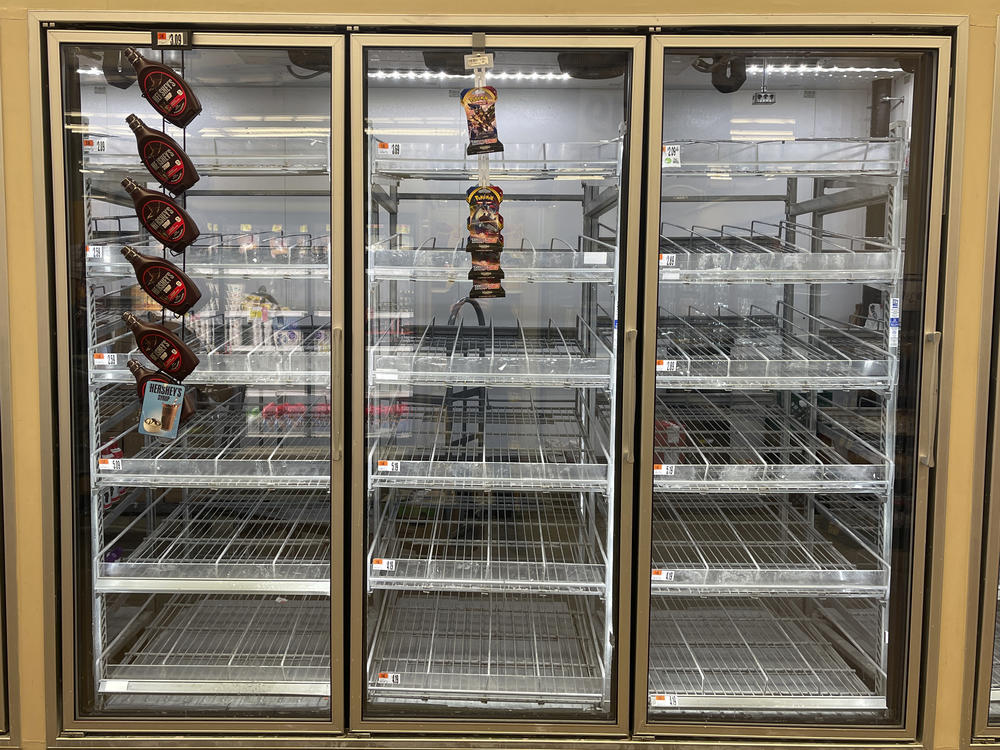Section Branding
Header Content
Grocery store shortages are back. Here are some of the reasons why
Primary Content
Updated January 12, 2022 at 4:37 PM ET
No, you're not imagining it. Some grocery store shelves are bare again, conjuring bad memories of spring 2020 for many.
Social media is rife with images of empty supermarket aisles and signs explaining the lack of available food and other items. Stores such as Aldi have apologized to customers for the shortages.
The reasons for the dwindling stock are numerous, according to food industry analysts, and include some issues that impacted retailers at the beginning of the pandemic as well as challenges that have cropped up more recently.
"We're really seeing the perfect storm," Phil Lempert, editor of the website SupermarketGuru.com, told NPR.
Lempert said the Northeast is facing some of the worst shortages now, due in part to recent winter storms that snarled transportation routes, but that could change with the weather.
But Nate Rose, the communications director for the California Grocers Association, said any comparison to March 2020 is not quite right.
"There are some issues with out-of-stocks, but it tends to be a situation where if you go to a store on a Tuesday night, maybe something's out of stock, but by Wednesday sometime it's back in store," Rose told NPR.
"Everyone's become really reliant on kind of that just-in-time supply chain," he added, "and I think what we're seeing is things are just behind a little bit right now."
Some conservatives have begun using the hashtag #BareShelvesBiden to blame the current administration for the shortages, even though grocery stores experienced serious supply problems under President Donald Trump, too.
Here are some of the reasons driving the current supply shortages at your local supermarket:
The omicron variant
The highly contagious new COVID-19 variant that's causing record infections in the U.S. is undoubtedly one of the biggest stressors on the food industry right now.
Grocery store workers are catching the virus in higher numbers and calling out sick, making it tougher for markets to keep shelves stocked. The stores themselves are finding it harder to source products because of the new strain.
Vivek Sankaran, CEO of the grocery store chain Albertson's, said in an earnings call that the company had been hoping to recover from recent supply issues but omicron "put a dent in that."
"There are more supply challenges, and we would expect more supply challenges over the next four to six weeks," Sankaran said on Tuesday.
It's more than grocery stores, though. There are workers all across the food industry supply chain who are getting sick and staying home, impacting food production, manufacturing, shipping and distribution.
The food company Conagra, the parent company of brands such as Duncan Hines and Healthy Choice, is just one seeing a rise in "omicron-driven absenteeism," President and CEO Sean Connolly said in an earnings call last week.
"It's entirely reasonable for all of us to project that the next month or so could remain strained within the supply chain as Omicron runs its course," Connolly said.
Labor shortages
In addition to workers becoming infected with COVID-19, there are those who have simply quit.
Lempert said the pandemic has turned grocery stores into "battlefields," with employees required to work in person throughout the pandemic, explain food shortages and new public health measures to customers, and try to keep themselves safe and healthy in the process.
"As a result of that, a lot of people said, 'Hey, I don't need this,' and they've left their jobs in the supermarket," Lempert said.
A recent survey conducted by the National Grocers Association found that many of its member retail and wholesale grocers reported operating their stores with 50% of their normal workforce.
Supermarkets are beginning to offer higher pay, better benefits and even tighter security to attract new applicants, Lempert said.
Trucking and shipping
Truckers are also in short supply, though there's some dispute about how bad the situation really is.
Trucking companies are offering higher wages to attract workers, but employment levels still aren't high enough to meet the demand for ground transport.
In December, the White House announced a plan to bolster the trucking industry, including making it easier for drivers to get commercial driver's license, or CDLs.
Severe weather and climate change
Climate change isn't a new problem, but it's one that's still vexing the food industry. Severe weather events are becoming more frequent and intense across the world as the planet warms.
According to Lempert, growers are yielding less corn and soy to feed farm animals, which is having a downstream impact on the price and availability of meat, eggs and dairy products.
In Brazil, heavy rains are inundating coffee fields and other crops, which is limiting production.
Severe weather is also making it harder to move food around.
Recent storms in Washington state prompted the closure of major roads and slowed the shipping of food to Alaska, where supermarkets told customers the one-two punch of severe weather and shipping delays were to blame for barren shelves.
Copyright 2022 NPR. To see more, visit https://www.npr.org.

